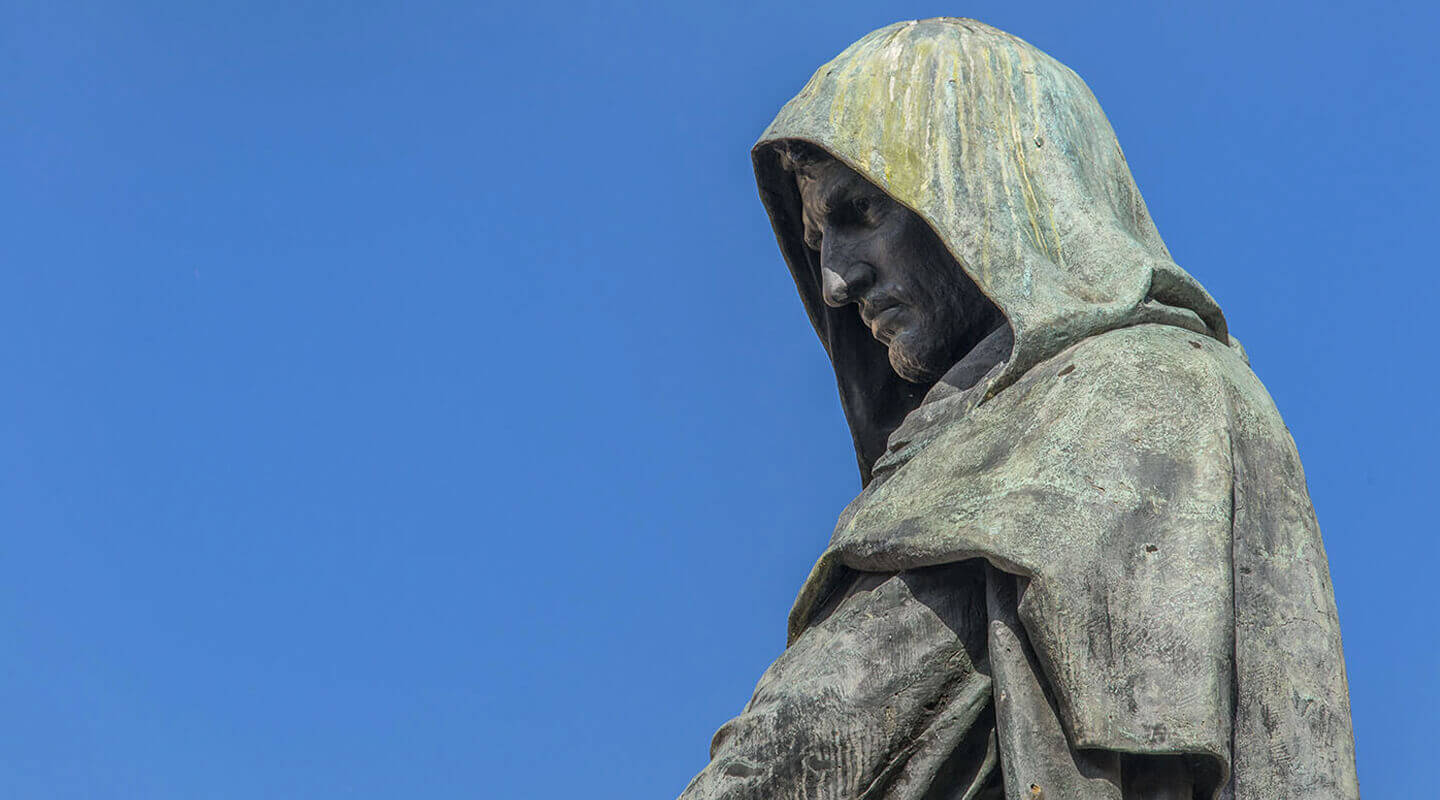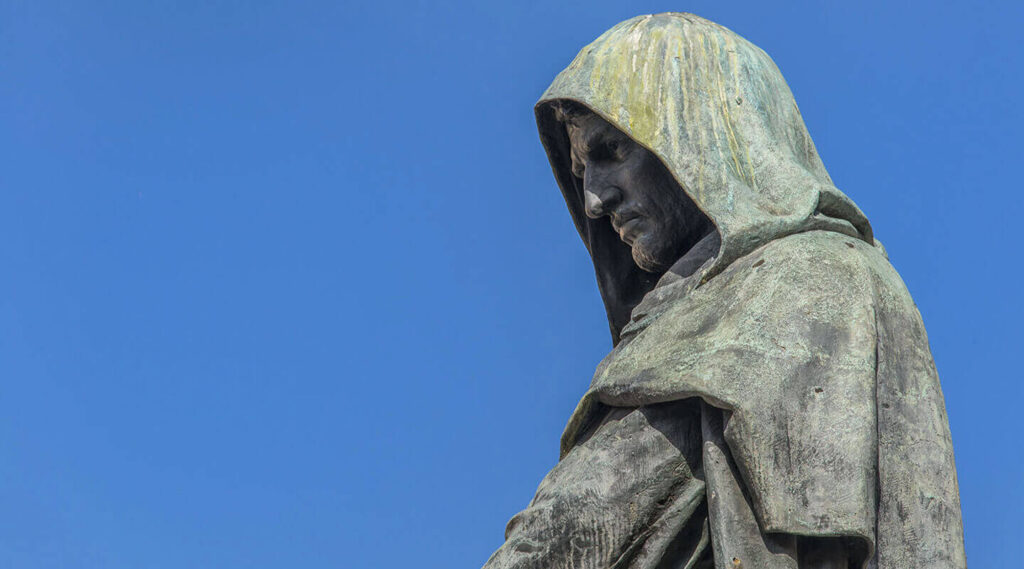
Giordano Bruno, an Italian polymath of the Renaissance, remains one of history’s most enigmatic and controversial figures. His revolutionary ideas on cosmology, philosophy, and theology not only defied the conventions of his time but also cost him his life. Bruno’s trial and execution continue to captivate modern minds, with his last words symbolizing his defiance and commitment to truth. This article delves into the life of Giordano Bruno, his final moments, and the significance of his last words.
Who Was Giordano Bruno?
Giordano Bruno was born in 1548 in Nola, a small town near Naples, Italy. A man of exceptional intellect, he was a Dominican friar, philosopher, mathematician, and astronomer. Bruno was a polymath whose work spanned numerous disciplines, including metaphysics, memory systems, and cosmology. He is best remembered for his bold advocacy of the idea that the universe is infinite and contains countless worlds—a concept that challenged the geocentric views held by the Church.
Bruno’s intellectual pursuits were heavily influenced by his thirst for knowledge, a trait that made him both a revered thinker and a target for persecution. His ideas often conflicted with established doctrines, leading him to question authority and dogma. His philosophical journey eventually led to his trial and execution by the Roman Inquisition in 1600.
The Philosophical Legacy of Giordano Bruno
Bruno’s contributions to science and philosophy were groundbreaking. He expanded upon the Copernican heliocentric model by proposing an infinite universe populated by innumerable stars and planets. This vision challenged the prevailing theological belief in a finite cosmos centered around Earth.
His philosophy also encompassed ideas about the soul, the divine, and human potential. Bruno viewed the universe as a manifestation of an infinite God, a perspective that aligned more with pantheism than the orthodox Christian teachings of his time. His works, such as De l’infinito, universo e mondi (“On the Infinite Universe and Worlds”), laid the foundation for later scientific and philosophical advancements.
The Journey to Martyrdom: Giordano Bruno’s Trial
Bruno’s radical ideas inevitably attracted the attention of the Catholic Church. In 1592, he was arrested and tried by the Roman Inquisition for heresy. The charges against him included his denial of key Catholic doctrines such as the Trinity, the virginity of Mary, and transubstantiation. More significantly, his cosmological theories were deemed heretical because they contradicted the Church’s interpretation of the Bible.
Bruno endured eight years of imprisonment and interrogation, during which he steadfastly refused to recant his beliefs. His unwavering commitment to his ideas, even in the face of death, underscored his deep conviction that truth was worth any sacrifice.
What Were Giordano Bruno’s Last Words?
Giordano Bruno’s last words have been a topic of historical intrigue and speculation. While there is no definitive record of his exact words, accounts suggest that his final moments were marked by defiance and courage. When the death sentence was pronounced, Bruno reportedly responded, “Perhaps you pronounce this sentence against me with greater fear than I receive it.”
This statement reflects Bruno’s unyielding spirit and his belief in the righteousness of his cause. It also highlights his perception of the Inquisitors as individuals blinded by fear of new ideas. Bruno’s final words resonate as a powerful testament to his intellectual bravery and his willingness to die for his principles.
The Execution: A Grim Reminder of the Price of Truth
On February 17, 1600, Giordano Bruno was burned at the stake in the Campo de’ Fiori in Rome. His execution was a grim spectacle meant to serve as a warning to others who dared to challenge the Church’s authority. Despite the brutality of his death, Bruno’s legacy endured, inspiring generations of thinkers who followed.
Witnesses to the execution noted that Bruno refused to repent or renounce his ideas. His stoicism in the face of such a horrific death cemented his status as a martyr for free thought and intellectual freedom.
Understanding Bruno’s Defiance
Giordano Bruno’s refusal to conform to the Church’s dictates was not born of mere obstinacy. It stemmed from his profound belief in the power of reason and the importance of seeking truth. His last words encapsulate his conviction that fear should not dictate human progress or suppress revolutionary ideas.
Bruno’s defiance serves as a reminder that the pursuit of knowledge often comes at great personal cost. His life and death underscore the tension between established authority and the human drive to explore and innovate.
The Impact of Giordano Bruno’s Ideas on Modern Thought
While Bruno’s contemporaries may have viewed him as a heretic, modern scholars recognize him as a visionary who paved the way for scientific and philosophical advancements. His ideas about the infinite universe anticipated later developments in astronomy and cosmology.
Moreover, his commitment to intellectual freedom and his willingness to challenge authority resonate with the principles of modern democracy and human rights. Bruno’s legacy continues to inspire those who value critical thinking and the pursuit of knowledge.
How the Renaissance Shaped Bruno’s Worldview
The Renaissance was a period of immense intellectual and cultural growth, and Giordano Bruno was a product of this transformative era. The Renaissance emphasized the rediscovery of classical knowledge, the questioning of traditional authority, and the celebration of human potential.
Bruno’s polymathic tendencies were a reflection of the Renaissance ideal of the “universal man.” His diverse interests and wide-ranging contributions exemplified the spirit of the age. The Renaissance not only shaped Bruno’s worldview but also provided the intellectual context for his revolutionary ideas.
Studying Bruno After a Gap: Rediscovering His Significance
For centuries after his execution, Giordano Bruno’s contributions were largely forgotten or overshadowed by the works of more celebrated figures like Galileo and Newton. However, in recent decades, there has been a resurgence of interest in his life and ideas.
Study after a long gap offers fresh perspectives on his significance. His cosmological theories, once dismissed as speculative, are now seen as precursors to modern scientific thought. Similarly, his philosophical insights into the nature of the universe and human existence continue to resonate with contemporary audiences.
Lessons from Giordano Bruno’s Life and Death
Giordano Bruno’s life offers valuable lessons about the power of conviction, the importance of intellectual courage, and the enduring value of free thought. His refusal to compromise his beliefs, even in the face of death, serves as a powerful reminder of the human capacity for resilience and integrity.
Bruno’s story also highlights the dangers of dogmatism and the need for open dialogue in the pursuit of truth. His legacy challenges us to embrace curiosity, question authority, and remain steadfast in our search for knowledge.
Giordano Bruno in Popular Culture
Bruno’s life and ideas have been celebrated and memorialized in various forms of popular culture. From books and films to monuments and public lectures, his story continues to capture the imagination of people worldwide.
One of the most notable tributes to Bruno is the statue erected in his honor at the Campo de’ Fiori, the site of his execution. The statue serves as a reminder of the enduring power of free thought and the sacrifices made by those who champion it.
Why Giordano Bruno’s Last Words Still Matter
Giordano Bruno’s last words resonate across centuries as a symbol of defiance against oppression and a commitment to intellectual freedom. In an age where ideas are constantly challenged and redefined, Bruno’s story serves as a reminder of the importance of standing firm in the face of adversity.
His courage and vision inspire those who dare to challenge convention and explore new frontiers of thought. By remembering Bruno’s last words, we honor the enduring legacy of a man who refused to let fear dictate his pursuit of truth.
Conclusion
Giordano Bruno’s last words, whether precisely recorded or not, embody the spirit of a polymath who valued truth above all else. His life and death remind us of the enduring struggle between authority and innovation, fear and courage, ignorance and knowledge.
By studying Giordano Bruno after a gap, we gain deeper insights into his contributions and the sacrifices he made for the sake of intellectual freedom. His story continues to inspire and challenge us to think boldly, question fearlessly, and pursue truth relentlessly.
Bruno’s legacy is a testament to the resilience of the human spirit and the transformative power of ideas. His final moments, marked by defiance and dignity, remain a powerful reminder of the price of progress and the enduring value of free thought.

